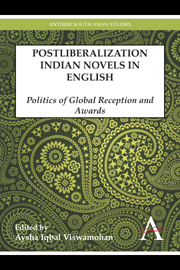Book contents
- Frontmatter
- Dedication
- Contents
- Acknowledgements
- Foreword
- Introduction
- 1 A Maverick Scholar: The Writings of Pankaj Mishra
- 2 Commodification of Post-Rushdie Indian Novels in English: Kunal Basu and the Politics of Decanonization
- 3 Marketing Lad Lit, Creating Bestsellers: The Importance of Being Chetan Bhagat
- 4 Vikas Swarup: Writing India in Global Time
- 5 The God of Small Things: Arundhati Roy's ‘Made in India’ Bookerboiler
- 6 Aravind Adiga: The White Elephant? Postliberalization, the Politics of Reception and the Globalization of Literary Prizes
- 7 ‘The Multinational's Song’: The Global Reception of M. G. Vassanji
- 8 ‘Shreds of Indianness’: Identity and Representation in Manju Kapur's The Immigrant
- 9 Inside ‘The Temple of Modern Desire’: Recollecting and Relocating Bombay
- 10 Tabish Khair: Marketing Compulsions and Artistic Integrity
- 11 Rohinton Mistry and the Canlit Imperative
- 12 Amitav Ghosh: The Indian Architect of a Postnational Utopia
- 13 Here, There and Everywhere: Vikram Seth's Multiple Literary Constituencies
- 14 Whatever Happened to Kaavya Viswanathan?
- 15 Of Win and Loss: Kiran Desai's Global Storytelling
- 16 Immigrant Desires: Narratives of the Indian Diaspora by Chitra Banerjee Divakaruni
- Glossary of Indian Words
- List of Contributors
- Bibliography
- Index
12 - Amitav Ghosh: The Indian Architect of a Postnational Utopia
Published online by Cambridge University Press: 05 July 2013
- Frontmatter
- Dedication
- Contents
- Acknowledgements
- Foreword
- Introduction
- 1 A Maverick Scholar: The Writings of Pankaj Mishra
- 2 Commodification of Post-Rushdie Indian Novels in English: Kunal Basu and the Politics of Decanonization
- 3 Marketing Lad Lit, Creating Bestsellers: The Importance of Being Chetan Bhagat
- 4 Vikas Swarup: Writing India in Global Time
- 5 The God of Small Things: Arundhati Roy's ‘Made in India’ Bookerboiler
- 6 Aravind Adiga: The White Elephant? Postliberalization, the Politics of Reception and the Globalization of Literary Prizes
- 7 ‘The Multinational's Song’: The Global Reception of M. G. Vassanji
- 8 ‘Shreds of Indianness’: Identity and Representation in Manju Kapur's The Immigrant
- 9 Inside ‘The Temple of Modern Desire’: Recollecting and Relocating Bombay
- 10 Tabish Khair: Marketing Compulsions and Artistic Integrity
- 11 Rohinton Mistry and the Canlit Imperative
- 12 Amitav Ghosh: The Indian Architect of a Postnational Utopia
- 13 Here, There and Everywhere: Vikram Seth's Multiple Literary Constituencies
- 14 Whatever Happened to Kaavya Viswanathan?
- 15 Of Win and Loss: Kiran Desai's Global Storytelling
- 16 Immigrant Desires: Narratives of the Indian Diaspora by Chitra Banerjee Divakaruni
- Glossary of Indian Words
- List of Contributors
- Bibliography
- Index
Summary
The history of Indian fiction in English goes back a long way in time. Even if we mark 1864 as the starting point of Indian fiction proper (the year of Chattopadhyay's Rajmohan's Wife), it is still, as a genre, almost one hundred and fifty years old. In her ‘The Anxiety of Indianness’, Meenakshi Mukherjee locates the various important milestones in this eventful journey, as well as the variety of challenges faced by its practitioners over the decades. The avowed aim of the first phase of these writers consisted of two definite strands. On the one hand, these writers had to engage themselves in the project of constructing national identity. This construction invariably depended on what Mukherjee describes as ‘an erasure of differences within the border and accentuating the difference with what lies outside.’ To this effect, in all these novels, a homogenized Indian tradition was deliberately constructed and pitted against an equally unified imaginary West. The Indianness in these works of Indian fiction rested upon the binary between the East and the West. At the same time, this construction of Indianness, both in the early phase and in the phase of nationalism, was not without a sense of anxiety, which came with a constant awareness of just how different the ‘alien reader’ (to whom these novels were primarily addressed) was. Mukherjee discusses elaborately in her essay how in the early phase these novels had to indulge in elaborate explanatory asides or semantic or lexical shifts, or how the writers had to be constantly on guard to keep English readers in good humour, the implicit anxiety being to uphold the ordinary Indian soldier's loyalty to the Crown.
- Type
- Chapter
- Information
- Postliberalization Indian Novels in EnglishPolitics of Global Reception and Awards, pp. 127 - 140Publisher: Anthem PressPrint publication year: 2013



